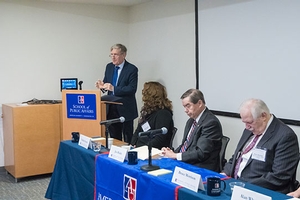Government & Politics
Brexit the Next Hurdle for Northern Ireland After 20 Years of Peace

Diplomats, politicians, academics, and students recently gathered at the American University School of Public Affairs (SPA) for a series of panel discussions on the Northern Ireland Peace Agreement, signed in April 1998.
"The Belfast agreement, also called the Good Friday Agreement, marked a profoundly important turning point in Northern Ireland, ending the conflict if not quite delivering peace," said SPA Dean Vicky Wilkins. "This event recognizes the recent 20th anniversary, and celebrates the accomplishment, considers the lessons learned, and explores possible paths forward."
In his opening remarks, Irish Ambassador to the United States, Daniel Mulhall, said that being part of the Irish government's delegation at the historic signing was one of the highlights of his career.
"I can't remember another day in my years as a diplomat when I have been so uplifted by what was happening and by the opportunity that great event presented for Ireland in shedding a legacy of 30 years of conflict and violence," Mulhall said.
It was important for Ireland to know the international community cared, Mulhall said, crediting then-U.S. Sen. George Mitchell (D-ME) with displaying patience and determination in the negotiations.
"His calm resolve and standing with the parties in Northern Ireland helped keep them at the table until that fateful day the Good Friday Agreement was signed," Mulhall said.
The Belfast Agreement was a major political development in the Northern Ireland peace process of the 1990s. Northern Ireland's present devolved system of government is based on the agreement. The agreement also created a number of institutions between Northern Ireland and the Republic of Ireland, and between the Republic of Ireland and the United Kingdom (UK).
Today, Mulhall said, a similar resolve is needed to implement the spirit and letter of the agreement in the wake of the UK's decision to withdraw from the European Union. The UK is scheduled to split from the EU on March 29, 2019. The UK and EU have provisionally agreed on the three "divorce" issues of how much the UK owes the EU, what happens to the Northern Ireland border and what happens to UK citizens living elsewhere in the EU and EU citizens living in the UK. Talks are now moving on to future relations – after agreement was reached on a 21-month "transition" period to smooth the way to post-Brexit relations.
"I hope this anniversary will remind us of the long and largely positive road we have traveled," Mulhall said. "We need to ensure there is no turning back of the clock in Northern Ireland. There is too much at stake."
Alan Whysall, a former British civil servant, said while life in Northern Ireland has changed for the better, problems remain, and differences are stark over Brexit.
"We are in danger of serious regression," Whysall said. "Unless something radically changes, I think we face continued division. The longer it lasts, the harder it becomes to recover and that will inhibit the process of reconciliation."
Former U.S. Reps. Bruce Morrison (D-Conn) and Jim Walsh (R-N.Y.) shared their experiences as members of congressional delegations to Ireland in the 1980s and 1990s. Some saw the Americans as meddling outsiders, but the congressmen both underscored the value of having American diplomats bring the parties together, shine a light on the process, and be committed to change.
"It is affirming to the people who are trying to continue the momentum going forward for us to reflect on this," said Kimberly Cowell-Meyers, an assistant professor in SPA, who helped coordinate the conversation on campus. "I love to think that we are contributing."
The event was co-sponsored by SPA, the AU School of International Service, Northern Ireland Bureau, Queen's University in Belfast, and the University of Ulster in partnership with the AU School of Communications and the Irish Network DC.

